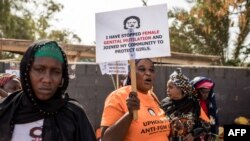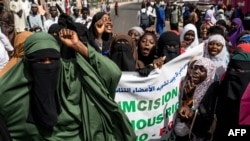Gambia’s parliament moved Monday to repeal its ban on female genital mutilation (FGM). The measure would make Gambia the first country to reverse a ban on the cultural and religious practice.
Lawmakers voted 42 – 4 to send the bill to a committee before returning it to parliament for a third reading.
Amnesty International says passing the bill would set a dangerous precedent for women’s rights and tarnish Gambia's human rights record.
Supporters of the bill argue that the ban stops them from practicing a cultural and religious obligation.
The World Health Organization says the practice has no benefit.
"This bill seeks to lift the ban on female circumcision in the Gambia, a practice deeply rooted in the ethnic, traditional, cultural, and religious beliefs of the majority of the Gambian people," said lawmaker Almameh Gibba, who introduced the measure. "The bill seeks to uphold religious plurality and safeguard cultural norms and values."
The plan to change the law has been met with criticism from women, activists and rights groups who say the lifting of the ban will hurt years of progress in protecting and empowering women and girls.
Michele Eken, a senior researcher with Amnesty International's West and Central Africa office, said allowing the practice of FGM back in the Gambian community is dangerous.
"It's disheartening that after such a long fight for women's rights and their advance in 2015 to have a ban against female genital mutilation, we have this huge setback," she said. "It would be completely disastrous for women's rights. It took almost ten years to get the first conviction against female genital mutilation and now we are basically telling young girls that their rights can be easily chipped away."
U.N. data indicates the prevalence of FGM in the West African nation has fallen since former president Yahya Jammeh banned the practice in 2015. It is punishable by up to three years of imprisonment.
Speaking to the local media after the bill was forwarded to a committee, Gibba said he will continue to fight to remove the ban.
"We will make sure that it's about the people," he said. "The bill is about the people for the people, and the people will stay in their processes. When it goes to the national consultation, whatever the determining factor is, we will take it as people decide. So we will not sit in a corner in our comfort zone and we make judgments on our own."
Eken hopes the parliament committee will give victims of FGM the platform to understand why the ban should remain.
"Speak to young girls who went through that and have serious complications, to speak to the family, to the sisters who lost their young ones because they died, they bled to death after female genital mutilation," she said. "I will ask them to be sure to include not only activists that are against female genital mutilation but to talk to women and young girls who suffered because of that."
The United Nations Children's Fund (UNICEF) says at least 30 million women globally have undergone FGM in the past eight years. For the 1.36 million women and girls in Gambia who face the danger of the practice, their hope lies with the parliamentary committee, which will be tasked with studying the bill before returning it to the parliament for a third reading.





